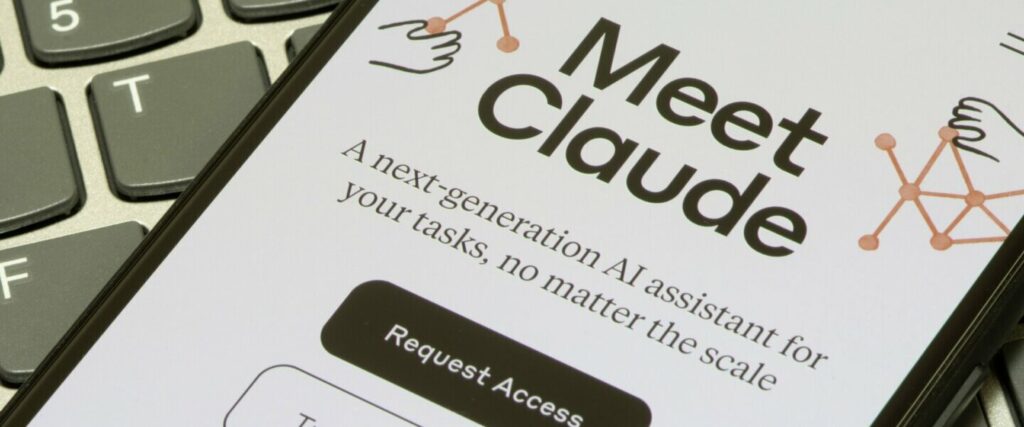
In the ever-evolving landscape of artificial intelligence, new players emerge, promising groundbreaking advancements, Claude AI large language model, is revolutionizing the way we interact with technology. One such contender is Claude AI by Anthropic. But how does it stack up against the reigning champion, ChatGPT? In this article, we delve into the features, capabilities, and potential of Claude AI, comparing it to ChatGPT to determine if it truly reigns supreme in the world of AI chatbots.
Table of Contents
What is Claude AI: An AI Assistant Rooted in Safety
Developed by Anthropic, a research organization dedicated to safe and beneficial artificial intelligence, Claude AI is an advanced chatbot designed to facilitate natural, informative, and secure conversations. Unlike many chatbots that prioritize witty banter or entertainment, Claude emphasizes providing accurate and helpful information while adhering to a set of predefined safety principles.
This emphasis on safety stems from Anthropic’s core philosophy. They believe that AI systems, especially those interacting directly with humans, should be aligned with human values and avoid causing harm. To achieve this, Claude is built upon a foundation of Constitutional AI (CAI), a framework that guides the chatbot’s behavior based on a set of predefined principles such as avoiding harm, being helpful, and acting with honesty.
Demystifying the Technology: How Does Claude AI Work?
At the heart of Claude AI lies a powerful language model trained on a massive dataset of text and code. This model allows Claude to understand the nuances of human language, interpret user queries, and generate coherent and informative responses. However, what sets Claude apart is its integration of Constitutional AI.
CAI acts as a guiding force for the language model, ensuring its responses adhere to the predefined principles. This framework operates through several mechanisms:
- Guiding prompts: During training, the language model is exposed to prompts that encourage responses aligned with CAI principles.
- Safety filters: Before generating a response, Claude passes it through a series of filters that identify and remove potentially harmful or misleading content.
- Human oversight: a crucial factor in the deployment of LLMs like GPT-4 and Claude, ensuring ethical use. Anthropic maintains a team of experts who monitor Claude’s performance and intervene if necessary.
This combination of advanced language modeling and CAI principles empowers Claude to engage in meaningful conversations while mitigating the risks associated with traditional chatbots, such as spreading misinformation or engaging in harmful interactions.
1. Leveraging Claude AI better than ChatGPT, for various tasks in 2022. What is Claude AI?
Claude AI is a state-of-the-art AI chatbot developed by Anthropic, a startup founded in 2023. Unlike traditional chatbots, Claude AI leverages an innovative approach to AI, termed “constitutional AI,” to enable more human-like interactions and responses. This novel concept, developed by Anthropic, aims to create AI systems that are not only highly capable but also ethical and aligned with human values. It is designed to be a versatile AI assistant that can be used for a variety of tasks, including:
- Learning and adapting: As a large language model, Claude can learn from its interactions with users and adapt its behavior accordingly.
- Understanding and responding to natural language: Claude can understand and respond to complex natural language, even if it is filled with jargon, slang, or emojis.
- Generating text using large language models (LLMs) like Claude 2.1. Claude can generate creative text formats, adapting to any prompt given. like poems, code, scripts, musical pieces, email, letters, processed with the efficiency of Claude 2, created by Anthropic, a notable advancement over traditional models. etc., and answer your questions in an informative way, even if they are open ended, challenging, or strange.
2. How Does Claude AI Compare to ChatGPT?
2.1 Performance and Accuracy
When it comes to performance and accuracy, Claude AI demonstrates remarkable capabilities. Trained on vast datasets and employing advanced language models, Claude AI boasts impressive understanding and responsiveness, rivaling that of ChatGPT. However, further comparative studies are needed to ascertain its superiority conclusively.
2.2 Ethical Considerations
One notable aspect where Claude AI distinguishes itself is in its emphasis on ethical AI. Anthropic’s constitutional AI framework ensures that Claude AI operates within predefined ethical boundaries, prioritizing user privacy, safety, and well-being—a feature not explicitly emphasized in ChatGPT.
2.3 Accessibility and Availability
While ChatGPT enjoys widespread accessibility, including a free version, Claude AI offers unique features and capabilities that may appeal to specific user demographics. Anthropic provides early access to Claude AI, allowing users to experience its functionalities firsthand and potentially shape its development.
3. Unlocking the Potential of Claude AI
3.1 Features and Capabilities
Claude AI introduces several innovative features that set it apart from traditional chatbots. From its ability to generate contextually relevant responses to its steerable AI systems, Claude AI empowers users to interact with AI in unprecedented ways, opening new avenues for exploration and application.
3.2 Use Cases and Applications
The versatility of Claude AI extends beyond casual conversation. With its robust AI models and ethical framework, Claude AI finds applications in various domains, including customer service, virtual assistance, and educational platforms. Its adaptability and scalability make it a valuable asset across industries.
3.3 The Future of AI with Claude AI
As Anthropic continues to refine and enhance Claude AI, the future of AI looks promising. With its commitment to ethical AI, innovative approaches, and user-centric design, Claude AI represents a significant step forward in the evolution of AI chatbots. Its potential to revolutionize human-AI interactions is unparalleled.
Challenges and Considerations for Claude AI
While Claude AI holds immense potential to revolutionize human-computer interaction, it’s crucial to acknowledge the challenges and ethical considerations associated with its development and deployment. Here are some key areas to consider:
1. Bias and Fairness:
- Training data bias: Like any AI system, Claude is susceptible to biases present in its training data. These biases can lead to discriminatory or unfair outputs, potentially marginalizing certain groups or perpetuating existing societal inequalities. Mitigating this risk requires careful selection and curation of training data, along with ongoing monitoring and adjustments to address any identified biases.
2. Transparency and Explainability:
- Understanding AI decisions: Claude’s decision-making process, guided by CAI principles and complex algorithms, might not be readily transparent to users. This lack of transparency can raise concerns about accountability and trust. Developers need to invest in explainable AI techniques that allow users to understand the reasoning behind Claude’s responses and actions, emphasizing the importance of transparency in getting started with Claude.
3. Misinformation and Disinformation:
- Potential for misuse: Despite CAI safeguards, malicious actors could potentially exploit Claude to spread misinformation or disinformation. Robust safeguards and monitoring mechanisms are necessary to prevent such misuse and ensure responsible use of the technology.
4. Job Displacement and the Future of Work:
- Automation concerns: As AI assistants like Claude 2.1 become more sophisticated, they offer capabilities that are better than ChatGPT. they could automate tasks currently performed by humans, using LLMs like GPT-4 and Claude, developed by Anthropic. raising concerns about job displacement and the impact on the workforce. Addressing these concerns requires proactive planning and policies to support reskilling and adaptation within the workforce.
5. Human Oversight and Control:
- Maintaining human control: As AI capabilities advance, it’s crucial to maintain human oversight and control over these systems. Clear guidelines and regulations are needed to ensure AI development and deployment, like that of Claude and ChatGPT, aligns with ethical principles and societal values.
Frequently Asked Questions about Claude AI:
1. What is Claude AI?
Claude AI is a next-generation AI assistant developed by Anthropic, focusing on Safe and informative conversations, a key aspect of AI safety.. It leverages advanced language models and ensures AI safety in its operations. Constitutional AI (CAI), a step towards ensuring AI safety. principles to provide factual answers, complete tasks, and engage in helpful interactions.
2. What can I do with Claude AI?
Currently, Claude can:
- Answer your questions: Get accurate and relevant information on various topics using Claude, a large language model.
- Summarize text efficiently with Claude 2.1, leveraging the power of large language models (LLMs). Generate concise summaries of lengthy articles or documents using LLMs like ChatGPT and Claude.
- Complete basic tasks using Claude AI, an advanced chatbot created by Anthropic: Create to-do lists, set reminders, or translate languages with the help of Claude, an advanced large language model.
As it evolves, Claude might offer:
- Personalized assistance: Tailored responses based on your preferences and needs.
- Creative tasks, enhanced by the capabilities of Claude 2, better than ChatGPT. Assist with writing, brainstorming ideas, or exploring creative text formats.
- Complex problem-solving: Collaborate with you to tackle intricate problems.
3. How is Claude AI different from other chatbots?
Claude prioritizes safety and factual accuracy over entertainment or casual conversation. It integrates CAI principles to ensure its responses are informed by the latest developments in LLM technology. helpful, honest, and avoid causing harm.
4. Is Claude AI safe to use?
Anthropic implements various safeguards to ensure Claude’s safety, including:
- Training on safe and informative data, focusing on AI safety.
- Safety filters to remove harmful content, a feature enhanced by the integration of LLMs like GPT-4 and Claude into platforms.
- Human oversight and monitoring.
However, responsible use and ongoing vigilance are crucial for maintaining a safe and ethical environment.
5. What are the potential applications of Claude AI?
Claude AI has potential applications in various fields, including:
- Education: Personalized learning assistance, providing explanations and answering student questions.
- Customer service: Offering efficient and accurate assistance while maintaining a friendly demeanor, a hallmark of Claude Pro.
- Healthcare: Highlighting the role of AI, such as Claude 2, in transforming patient care through AI safety and efficiency. Assisting medical professionals with information access, data summarization, and potential preliminary diagnoses (under strict supervision), showcasing the importance of AI safety in healthcare.
6. What are the challenges and considerations for Claude AI?
Key challenges include:
- Bias and fairness: Mitigating biases in training data to ensure fair and non-discriminatory outputs.
- Transparency and explainability: Core principles of Claude Pro, created by Anthropic, enhancing trust in AI systems. Making Claude’s decision-making process more transparent to users.
- Misinformation and disinformation: Preventing misuse of Claude to spread harmful or misleading information.
- Job displacement: Addressing potential job losses due to automation by AI assistants.
- Human oversight and control: Maintaining human control over AI development and deployment.
By addressing these challenges and fostering responsible development, Claude AI can contribute to a positive future for human-computer interaction.
Conclusion: The Verdict on Claude AI vs. ChatGPT
Claude AI represents a significant advancement in the field of safe and informative conversational AI. Its potential to enhance human-computer interaction and provide valuable assistance across various domains is undeniable. However, addressing the challenges and ethical considerations outlined above is critical to ensure responsible development and deployment of this technology, including advancements like GPT-4 and Claude by Anthropic. By fostering open dialogue, collaboration between stakeholders, and ongoing research, we can harness the potential of Claude AI while mitigating potential risks and building a future where AI serves humanity in a safe and beneficial manner.
In the ongoing debate between Claude AI and ChatGPT, there is no clear winner, but both represent significant advancements in large language model technology. Both AI chatbots offer unique strengths and capabilities, catering to diverse user needs and preferences. While Claude AI excels in ethical considerations and innovative features, ChatGPT maintains its position as a reliable and widely accessible option. Ultimately, the choice between Claude AI and ChatGPT depends on individual requirements and priorities.
Key Takeaways:
- Claude AI introduces a novel approach to AI chatbots, emphasizing ethical considerations and innovative features, showcasing the capabilities of large language models.
- Comparative studies are needed to determine if Claude AI surpasses ChatGPT in performance and accuracy.
- Claude AI offers early access opportunities, allowing users to explore its capabilities firsthand.
- The future of AI with Claude AI holds promise, with its potential to revolutionize human-AI interactions and applications.
You can also read about AI technology trends in next 10 years.






